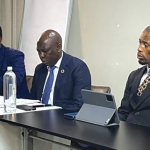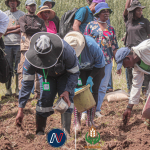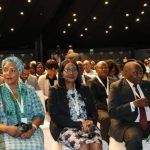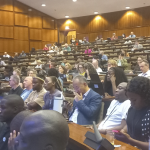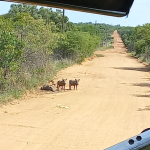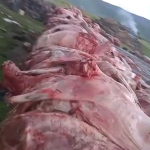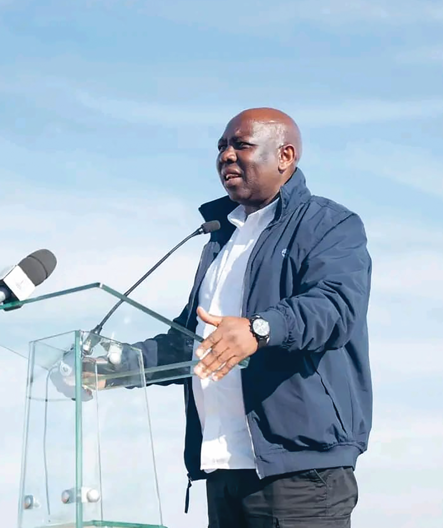In a momentous step towards revitalising Lesotho’s livestock sector, the Thabeng ea Senai Breeders Community (TSBC) officially launched a groundbreaking red meat production project in Mokhethoaneng.
What began as a bold idea in 2024 has matured into a national initiative with the potential to transform Lesotho into a self-sustaining red meat producer and regional competitor.
The launch, marked by traditional prayer, song, and dance, signalled more than just the start of a project; it ignited renewed hope for Basotho farmers.
The TSBC initiative, under the leadership of Sebabatso Makoanyane, brings together breeders, researchers, and policymakers to boost local red meat production, reduce dependence on South African imports, and build a resilient agricultural economy.
Addressing attendees, Dr. Irene Sealiete, CEO of TSBC, outlined the scope of the initiative: “We subscribed to a company that safeguards our operations, established a blood institution, created feedlots in Maseru, Thaba-Tseka and Qacha’s Nek, procured 20,000 high-grade female cattle, and trained 100 animal scientists in artificial insemination.”
She also confirmed the formation of the TSBC Blood Centre, which officially commenced operations on launch day.
The project’s reach has expanded rapidly, now boasting over 100,000 registered members country-wide. It is built on principles of science-based breeding, modern feedlot systems, and farmer empowerment through education and access to genetic resources.
Representing Metolong Breeding Zone, Tseliso Nkuka, emphasised the project’s value in unlocking untapped wealth.
“Basotho own livestock, yet we often overlook its economic power. Thabeng ea Senai is showing us what’s possible when we invest in our own cattle with intention,” he said.
Local council member Sakaria Tlali praised the initiative’s community impact, offering gratitude to Makoanyane for what he called “a transformative idea that gives life to our hopes.”
The event also welcomed Dr. Fanie from Ramsen/Absolute Genetics, a global expert in livestock genetics, who pledged international support. “It’s a privilege to partner with Lesotho,” he said, highlighting the country’s vast potential in red meat production.
On the government side, Chief Animal Officer Molefe Petlane reiterated national support: “This project directly addresses our over-reliance on imported meat. With TSBC, we are laying the groundwork for national self-sufficiency in red meat.”
Parliamentary representative Hon Mokhothu Makhalanyane commended the TSBC’s founder, sharing pride in the vision.
“You have our full support as you lead Basotho into a new agricultural era.”
At the heart of the day’s proceedings was Sebabatso Makoanyane, the young visionary behind TSBC. In a moving address, he traced the project’s origins to an idea conceived two years ago.
“I dreamt of local red meat production that could stand toe-to-toe with international markets. I approached Professor Setsumi Molapo, and together with other partners, we began building what you see today,” he said.
Professor Molapo, of the National University of Lesotho, praised Makoanyane’s perseverance: “He brought a bold idea to my office. What began as a vision has now become a reality backed by science, innovation, and partnership.”
The project has also earned international recognition, including a CENAGE award from the World Trade Organisation, acknowledging its potential to reshape Lesotho’s livestock economy.
Makoanyane was candid about challenges, particularly gaining the trust of Basotho farmers.
“Many viewed me with suspicion, and I understood because livestock is deeply personal in our culture. But I remained committed, not to selling dreams, but to building a future where Basotho benefit from their own cattle.”
He added: “Lesotho imports over M1.5 billion worth of red meat annually. By increasing local production, that money can circulate within our economy, benefiting our farmers and communities.”
In a heartfelt plea to the government, Makoanyane called for policy support and fewer restrictions.
“We are not politicians. We are agriculturalists trying to feed our people. We ask the government not to interfere unnecessarily but to support us. We have the networks, international backing, and the will. We simply need the space to operate.”
Minister of Agriculture, Thabo Mofosi, closed the ceremony with a firm promise of government support.
“You have my full backing. This is the kind of bold, self-driven agriculture Lesotho needs. You are not only creating food, but jobs, hope, and dignity.”
A ceremonial sod-turning followed, symbolising new beginnings. Traditional performances and jubilation from Mokhethoaneng residents captured the day’s spirit: pride, progress, and purpose.

